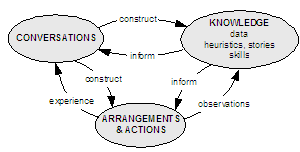![]()
----------------
See also...
The Planner and conversations
Experience with the Planner has been consistently indicating that everyday conversations are the critical link between data and achieving improvements.
Experienced users see the Planner as
- being about having better informed, and more productive, conversations that
- lead towards higher levels of response by all concerned
- in order to achieve better outcomes (often through coaching)
Increasingly the Planner is being used in a ever widening range of conversations
- staff - staff
- staff - students
- staff - support professionals
- staff - families
- support professionals - students (& families)
- and so on..
Here is a basic set of coaching questions being developed by Sally Milbourne and her staff at Perth Primary for use in their everyday conversations with students.
Levels of response
There are six common levels of response identified so far (each level includes some aspects of most of the other levels)
- Ad hoc - as in 'Welcome back Kotter' & ' Seven Periods With Mr Gormsby'
- Reactive - criticising, correcting, zero tolerance, three strikes, consequences, sending home reports, etc
- Responsive - achieving resolution of situations that arise
- Proactive - putting in place measures that significantly reduce the occurrence of incidents
- Capacity building - focusing on developing the capacity of the school (staff and programs) to meet the needs of all involved within the everyday life and work of the school
- Community building - achieving a culture shared throughout the school and with the community in which differences & conflicts are dealt with easily and well.
The Planner, conversations and levels of response
It appears that using the Planner in conversations with staff, students and parents makes it easier for everyone to move to a higher level of response. For example, the following true story illustrates a parent moving from Level 2 to Level 4 in the course of a brief conversation informed by the Planner....
- The (understandably) irate parent came in to school to complain that her daughter was about to be suspended and that the school had failed to give any warning to the family.
- The parent moved from being reactive (Level 2) to collaborating (Level 3) with the school when shown all the information available from the Planner
- It was easy for the parent to see that
the school
- cared, and was prepared to be accountable
- had done the right thing by both child and parent
- was concerned for the student and
- had done lots of things to try to resolve the student's deteriorating situation
- It quickly became clear that the daughter had intercepted all related
phone messages and letters from the school, but all was not lost because...
- the messages and letters were documented in the Planner and
- the letters were immediately available directly from the Planner
- As a result the parent became proactive (Level 4) in terms of working with the school to set up arrangements to get the girl back on track.
Many schools have very similar stories to share.
Another user reports
"Another connection between conversations and the Planner has been discovered by accident. A great tool for induction of new staff, the ability to discuss student support, pedagogy, school wide expectations and insight into a new class. The essence again is creating conversations that lead to positive and necessary outcomes."
Conversations, knowledge, arrangements and actions
In our everyday conversations, we continually construct (and reconstruct) our
- knowledge
- data
- heuristics
- stories
- skills
- arrangements
- actions
so that we are able to respond to the situations in which we find ourselves
For better or worse, out of these 'everyday' conversations (in the school
context) come
- actions and arrangements
- major learning about ourselves, each other, our institutions, what it does or doesn't do well, where its trouble spots are....
- recognition of student, staff and family needs
- recognition of student, staff and family achievements
- plans for collaborative supporting action in response to needs
- changed ways of talking about all aspects of the school
- professional learning for all in the everyday life and work of the school
- school capacity building
- ultimately building the school as a peaceful, purposeful community.
Summary
Conversations,
informed by the data in the Planner, assist people to make sense of their shared
situation and to make higher level collaborative responses.

